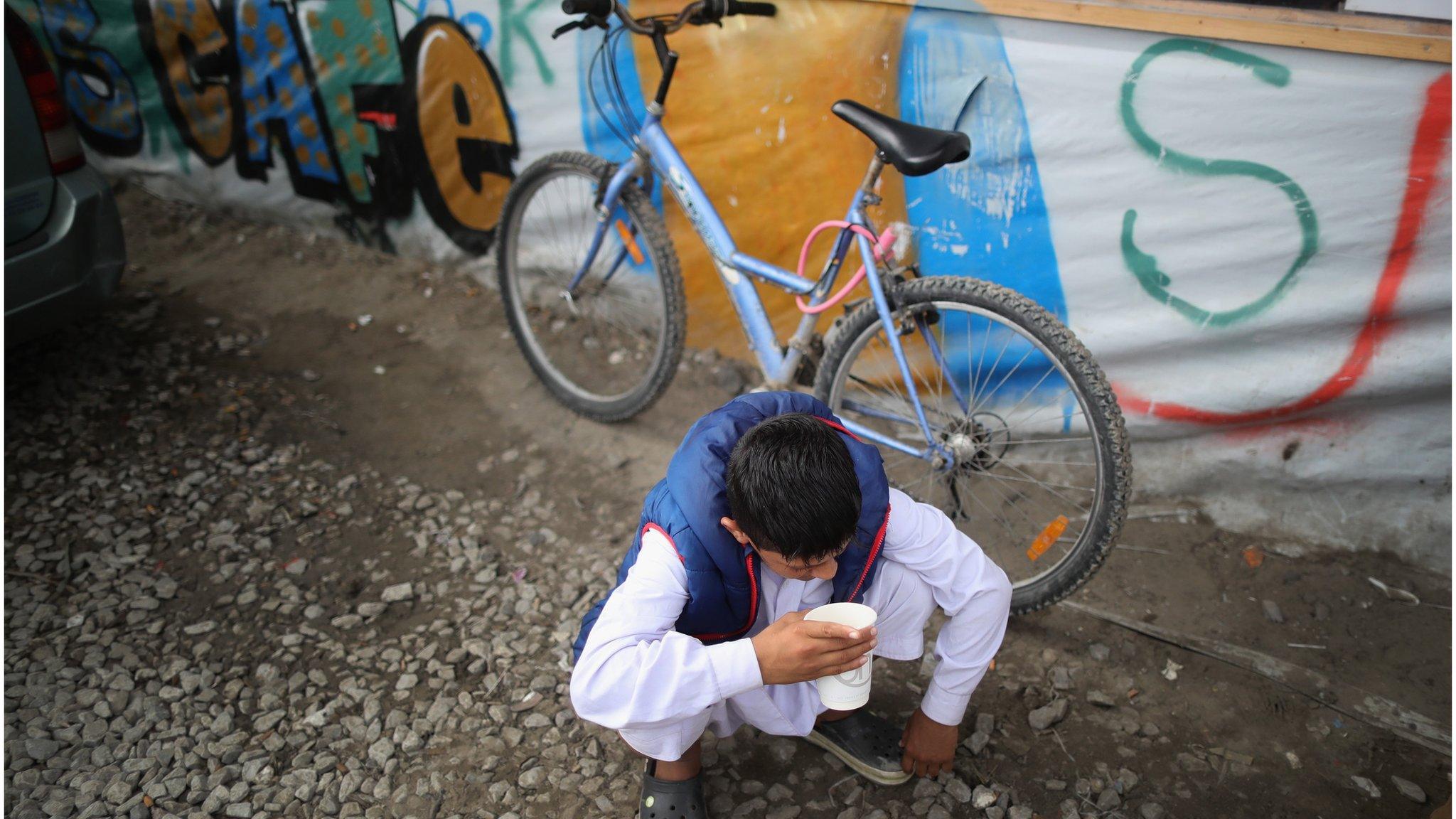Families speak of their joy at being reunited with Calais children
- Published
Ed Thomas reports from the "Jungle" in Calais on the children trying to reach the UK
The brother of a child migrant coming from Calais to the UK said it will be a "blessing" to have him back.
Asif Khan, 25, fled Afghanistan to come to the UK 11 years ago, but his younger brother Aimal, 14, stayed behind.
Six months ago, his sibling made it to Calais, but had not yet made the final leg of his journey across the Channel to be reunited with his brother.
Now he is one of 14 migrant children who have been brought into the country to join their families.
Asif, who works as a chef, told the Press Association: "I really appreciate this. It was a blessing to receive him from there - I'm really happy.
Zoe Conway reports for Radio 4's Today from the Calais "Jungle" camp
"His journey was so difficult, it was by walking, by bus to Calais. He gets a new life now, because there are many people who died in Calais."
He said his journey to the UK was "hell" every night and he felt huge relief that the experience was over for his brother.
Asif added: "I will just hug him because I haven't seen him since I left - I just miss him."
'The clock is ticking'
The former Archbishop of Canterbury, Rowan Williams, travelled to Croydon, south London, to meet the children on their arrival and accused the government of dragging its feet over accepting the young people from Calais' Jungle camp.
All 14 migrant children aged 14 to 17 have now arrived in the UK and will later be reunited with relatives.
French President Francois Hollande has said he wants the camp to be shut by the end of the year and on Monday, signs began to go up on shops giving them 48 hours to vacate.
The chief of police in Calais would not confirm the date that the camp would be demolished, but said notices would go up either 48 or 24 hours beforehand to warn people.
But Lord Williams said no process had yet been put in place to accept children without family in the UK.
Home Secretary Amber Rudd last week indicated unaccompanied children, both those with and without relatives in the UK, would be allowed into Britain.
An EU regulation allows children to seek UK asylum because they have close relatives in the country but a number of other children became eligible for admission under an amendment to the Immigration Act introduced in May by the Labour peer Lord Dubs.
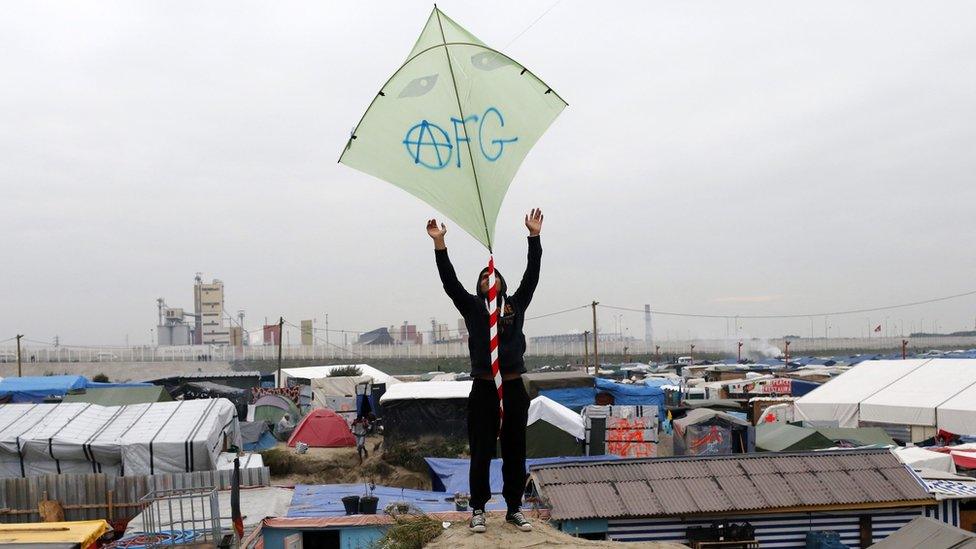
Speaking on BBC Radio 4's Today programme, Lord Williams said the UK had a "basic moral imperative" to offer security to "deeply traumatised and deeply needy people".
He said: "We have the beginnings of some sort of response to what is still a hugely troubling... situation."
Lord Williams said more than 3,000 places for children without relatives in the UK had been offered by 44 local councils.
He said while it was "very welcome that at last the government has taken some official steps to get the children coming... I'm not sure why there is such foot-dragging".
He added: "But we have had confirmation that the home secretary is eager to see movement... and we want to press that willingness and make sure it delivers".
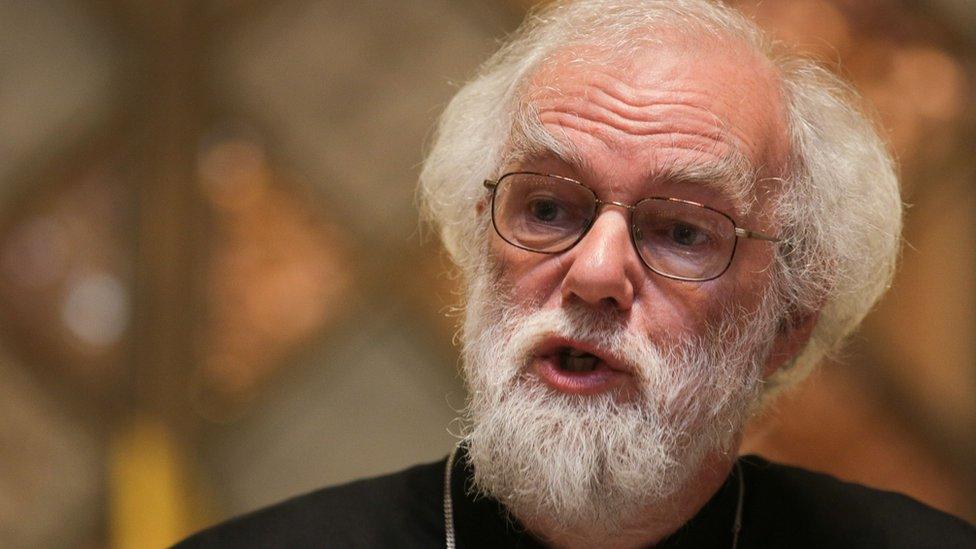
The former Archbishop of Canterbury is among the religious leaders to have raised concerns about the plight of the children
Under EU rules, asylum claims must be made in the first safe country a person reaches, but children can have their claim transferred to another country if they have family members living there.
Meanwhile, the Local Government Association, which represents local authorities in England and Wales, has said councils will require long-term help from the government so the support of unaccompanied children is "properly funded".
'Matter of urgency'
Most of those arriving in the UK later are understood to be teenage boys.
They are from Afghanistan and Syria, while one is a stateless Bidun who originated from Kuwait.
They are among about 100 minors who will be brought over by the Home Office.
Their first task will be to register with the Home Office in Croydon.
A number of checks also need to take place, to ensure they will be in a safe environment with their relatives. Ahead of any family reunions, the children will be cared for by state agencies.
A Home Office spokesperson said: "This is the start of the process to transfer as many eligible children as possible before the start of the clearance, as the home secretary set out in Parliament.
"These vulnerable children... were transferred to the UK under the care of Home Office staff, with the support of volunteers from specialist NGOs and charities. They will join their families in the UK as quickly as possible over the coming days."
Anne Longfield, children's commissioner for England, said: "For those arriving, plans must be in place to ensure they are supported to get over their traumatic experiences, into schools and that they get any health treatment needed.
"Apart from those with rights to come to the UK there are several hundred other children in the camp, the vast majority on their own."
The charity Citizens UK, which is working alongside the government, echoed Lord Williams's concerns over the plight of children with no family connections in the UK.
"These are children who are particularly vulnerable. It appears that no system has been put in place to register and assess these children, despite assurances from home secretary," it said.
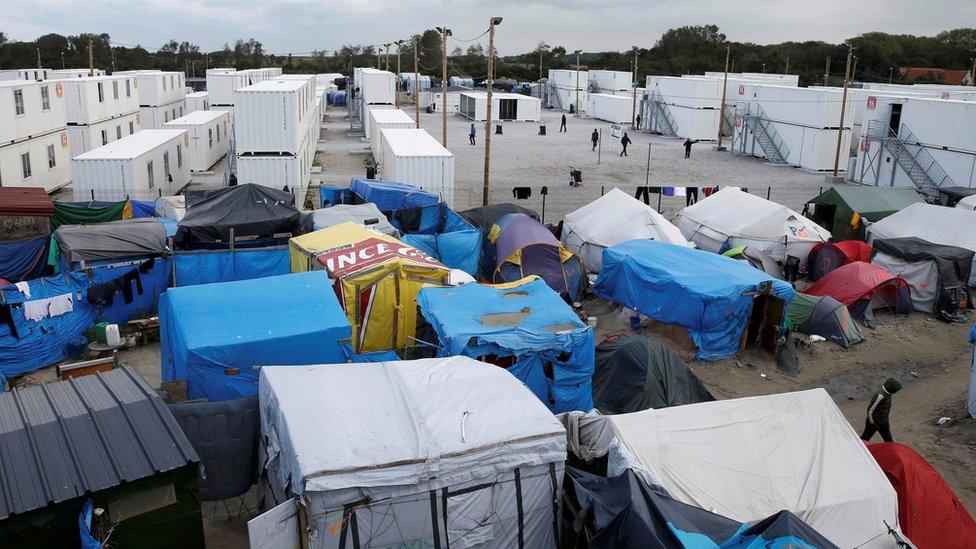
French President Francois Hollande wants to demolish the Jungle camp
And Lord Dubs, whose amendment to the Immigration Act 2016 requires the government to relocate unaccompanied refugee children from Europe, said: "Looking ahead we must never allow a repeat of Calais.
"The government must learn lessons from this situation and realise that it has a duty to make the Dublin mechanism work across Europe, as well as establishing a clear procedure for children without family eligible for sanctuary under the Dubs amendment."
It is estimated up to 10,000 people are living in the Jungle, which is situated near the port of Calais, and close to the 31-mile Channel Tunnel.
Many of the migrants in northern France attempt to reach the UK by boarding lorries as they approach ports or the tunnel.
President Hollande wants to move the inhabitants of the Jungle to reception centres across the country and demolish the camp.
Aid groups have raised concerns that the planned closure will lead to children disappearing before they are processed.

- Published16 October 2016
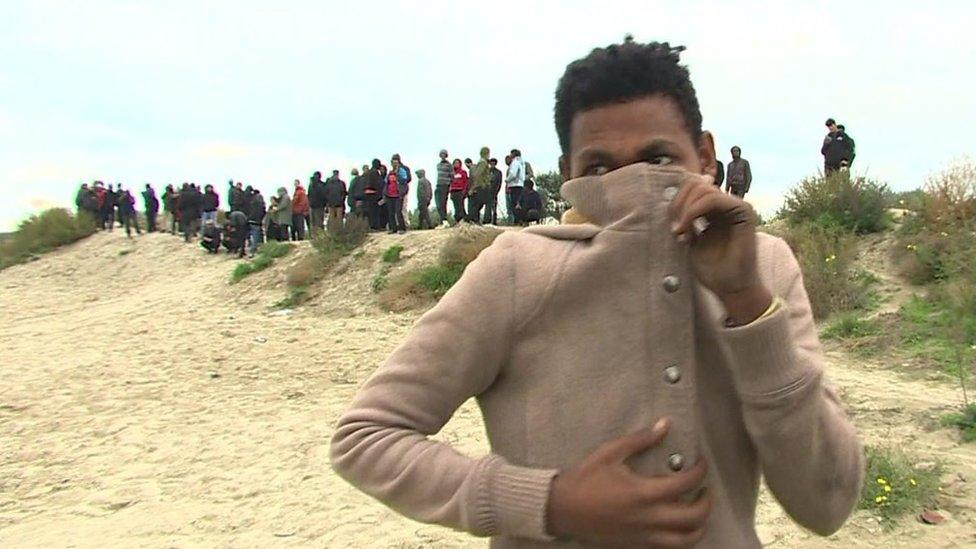
- Published15 October 2016
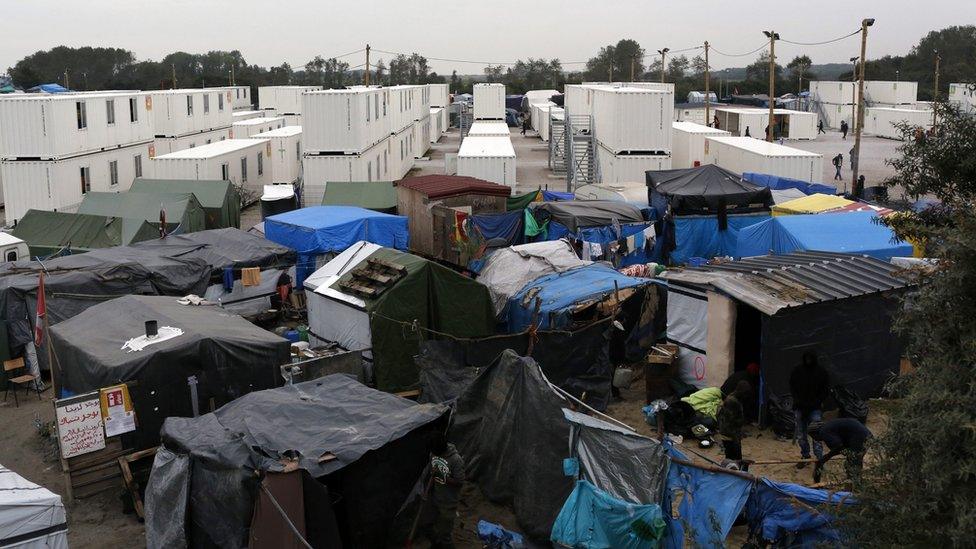
- Published13 October 2016
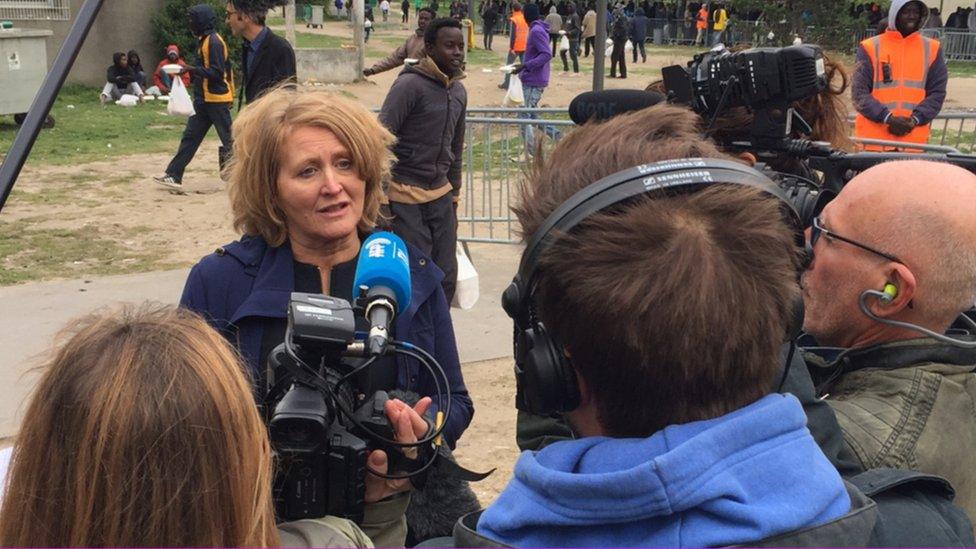
- Published10 October 2016
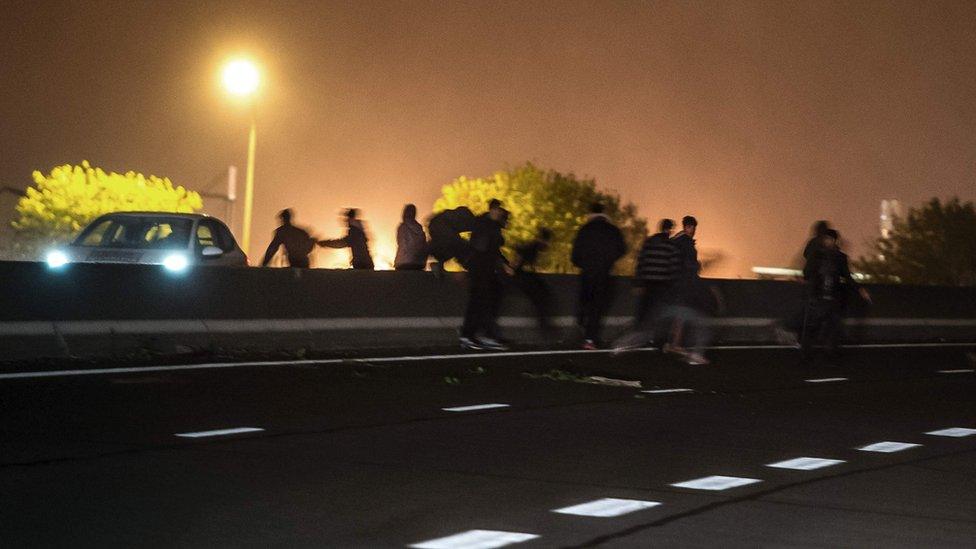
- Published10 October 2016

- Published1 October 2016
